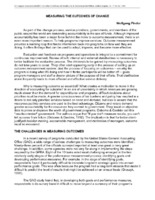Measuring the outcomes of change
Resumen
This paper focuses on three major topics. First, why do we measure outcomes? Second, the challenges in measuring outcomes, and third, strategies for outcome measurement. The central questions in outcome measurement are: to what extent does the agency's performance plan provide a clear picture of intended performance and to what extent are performance outcomes actually achieved. An annual performance plan is necessary to compare actual outcome results with performance goals. To do this, the agency must set goals, develop measures, and show in its performance plan how it will use these goals and measures to assess performance. The performance measures contained in the annual performance plan should adequately indicate progress towards the performance goals. When performance goals are not self-measuring, performance measures should translate those goals into concrete, observable. A clear relationship should exist between an agency's long-term strategic goals and mission and the performance goals in the annual performance plan. The annual performance goals should reflect the strategic goals and mission. The annual performance plan should identify annual performance goals that cover all of the program activities in the agency's budget. Aggregating program activities consists of applying the same performance goals and measures to several program activities within a budget account. If applicable, the annual performance plan should identify performance goals that reflect activities being undertaken to support programs of a crosscutting nature. Agency funding should be directly tied to the measurable performance outcomes achieved by the agency's programs.


